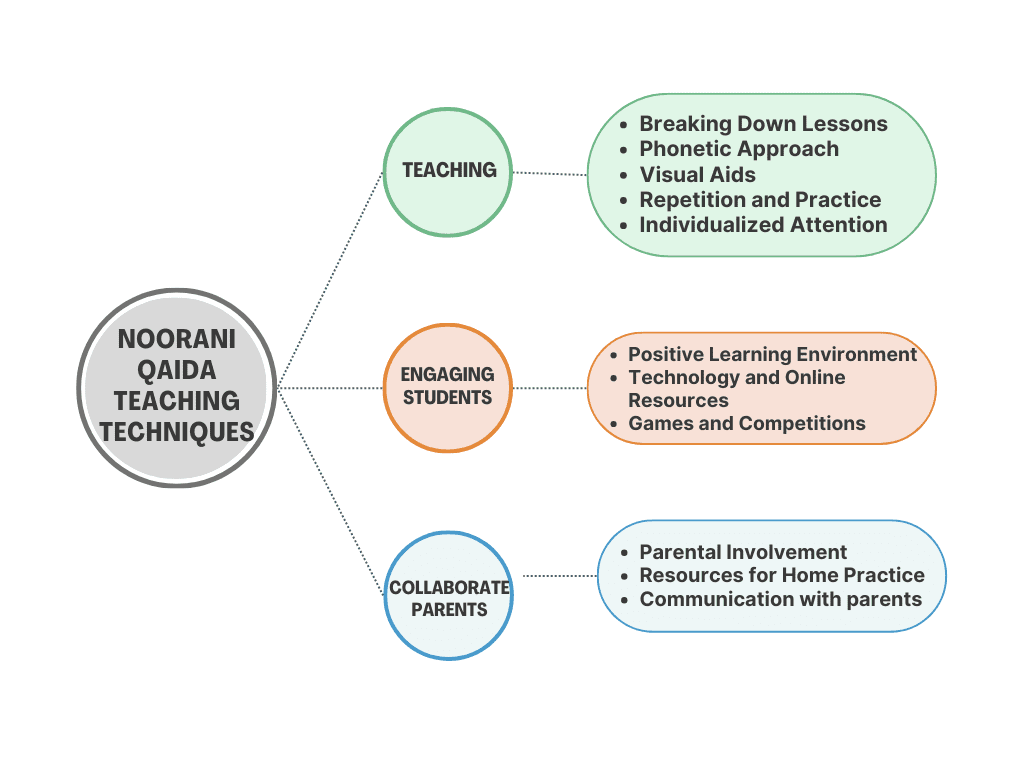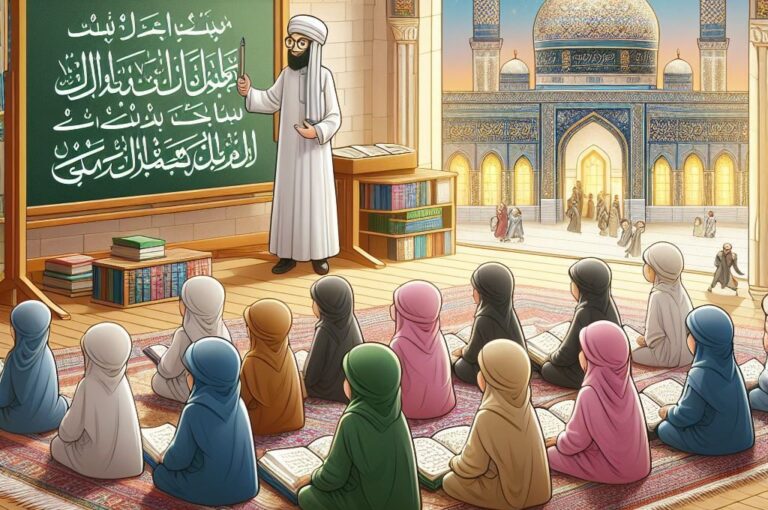11 Effective Teaching Techniques for Noorani Qaida
The journey of Quran learning begins with the Noorani Qaida, an essential primer in Quranic education for beginners. For successful learning outcomes, it is mandated to learn effective teaching techniques for Noorani Qaida. For Muslim parents and Islamic educators, teaching the lessons of Arabic Noorani Qaida is both a responsibility and an opportunity to lay the foundations of not just fluent Quran recitation but also a lifelong love for Islamic learning.
In this post, we will delve into the best teaching techniques for Noorani Qaida that are practical, engaging, and cater the unique needs of each student. We’ll cover strategies that blend time-honored methods with innovative approaches, ensuring your educational practices resonate with today’s learners.
Teaching Techniques for Noorani Qaida

When exploring the question of how to teach Noorani Qaida, especially to parents and teachers, incorporating effective teaching techniques for Qaida is paramount for successful learning outcomes. The core of any successful educational approach is flexibility and understanding of the learner’s needs. Here’s how you can customize your teaching techniques to be most effective:
Teaching Methodology

1. Breaking Down Lessons
The foundation of teaching this Arabic Qaida script starts with breaking down lessons into manageable sections, ensuring students are not burdened and can absorb the lesson at their comfortable pace. Dividing the lessons into small, manageable sections, allows students to grasp one concept at a time. Let’s learn them at their own pace to make the foundation strong. So each Qaida has divided its lesson in appropriate sections.
2. Phonetic Approach
Each letter has a unique sound. Understanding these sounds is crucial for effective learning. A phonetic approach to teaching Noorani Qaida, which aligns well with learning English, helps students easily memorize particular sounds for each letter.
3. Visual Aids and Interactive Activities
Incorporating ideas for visual aids can significantly enrich the learning experience for beginners. This tool helps with memory retention and makes the lessons more memorable for learners. Enhance understanding by using visual aids, such as letter charts, color coding, half shaping letters and engaging through interactive activities like letter tracing or using Noorani Qaida app. Many studies reveal the huge impact of good visual aids in effective learning.
4. Repetition and Practice
Repetition and practice remain the cornerstone of mastery; thus, regular revision of previous lessons is crucial in solidifying the knowledge gained. Create a routine that allows students to practice regularly. Repetition is key in memorizing the material and improving pronunciation.
5. Individualized Attention
Providing individualized attention caters to the diverse learning styles and paces of students, allowing those who might struggle with certain aspects of Qaida to receive the support they need. Every student is unique. Offer a personalized learning environment and feedback and adapt your teaching technique to their learning pace and style.
Engaging Students
A student’s enthusiasm is pivotal to their learning progress. Keep them engaged with these approaches:

6. Positive Learning Environment
Foster a nurturing environment where mistakes are treated as learning opportunities. Celebrate improvements and make learning a joyous process. Please encourage students to participate actively in online quizzes, and discussions and allow them to ask questions. Make them feel involved and heard during the learning process.
7. Technology and Online Resources
Embrace the digital age. Use online platforms and applications to make learning more accessible and fun. Distance learning is prevailing these days. Arrange an online portal to update students about their academic status.
8. Games and Competitions
Incorporate educational games like letters joining games, fill in the blanks, multiple choice questions, completing vowels, and joining the dots. Arrange friendly competitions to motivate students and make the learning process more enjoyable.
Collaboration with Parents
Parents play a vital role in reinforcing what’s taught in the classroom.

9. Parental Involvement
Parents’ involvement in their children’s education leads to better academic results, according to studies. Engage parents by giving them an overview of the Qaida and providing tips on how they can assist at home.
10. Resources for Home Practice
Practice makes a man perfect. Usually, Qaida students read it only for a few minutes when they are with tutors. It is recommended to revise and practice at home too. Providing guidance, a portal, worksheets, the Qaida Noorania app, and digital resources that parents can use for home practices, is an effective teaching technique.
11. Communication with parents
Establish reporting and feedback channels with parents to discuss student progress and address concerns. For this purpose monthly parents and teachers meetings should be organized. If physically meet up is not possible than it may be online one to one meeting at their own pace.
Effective Teaching Techniques Conclusion
Implementing effective teaching techniques for Noorani Qaida is instrumental in guiding students. With a balance of tradition and innovation, both Muslim parents and educators can contribute to creating not just proficient reciters of the Quran but also engaged learners who embark on a lifelong journey with Islamic education.
Remember, the goal is to develop a love for the divine script, and the joy in learning it. By using the strategies highlighted above, you can create a creative environment that’s effective to learning the Qaida, thus paving the way for students to embark on a fulfilling path of Quranic understanding and spiritual growth.





